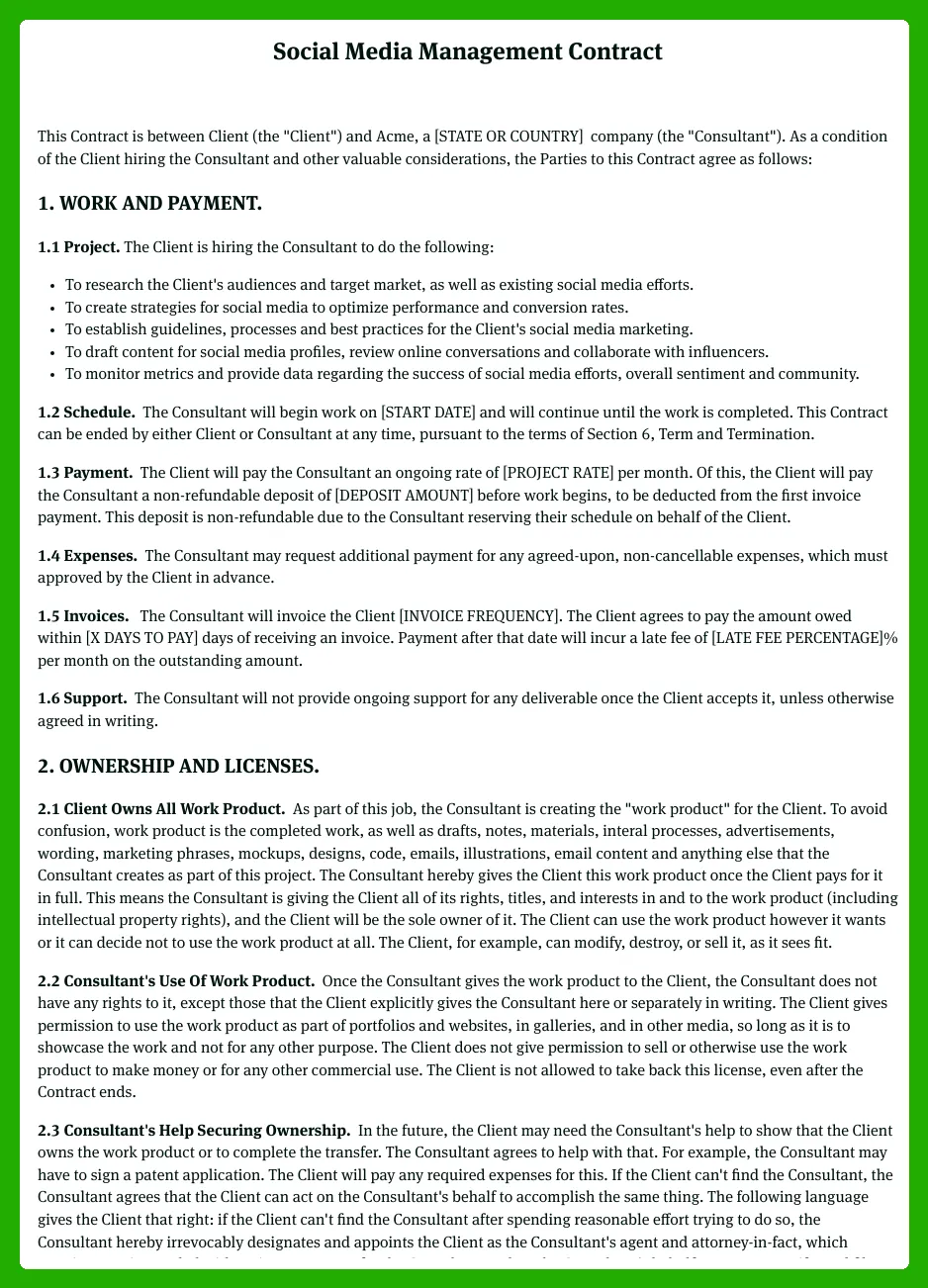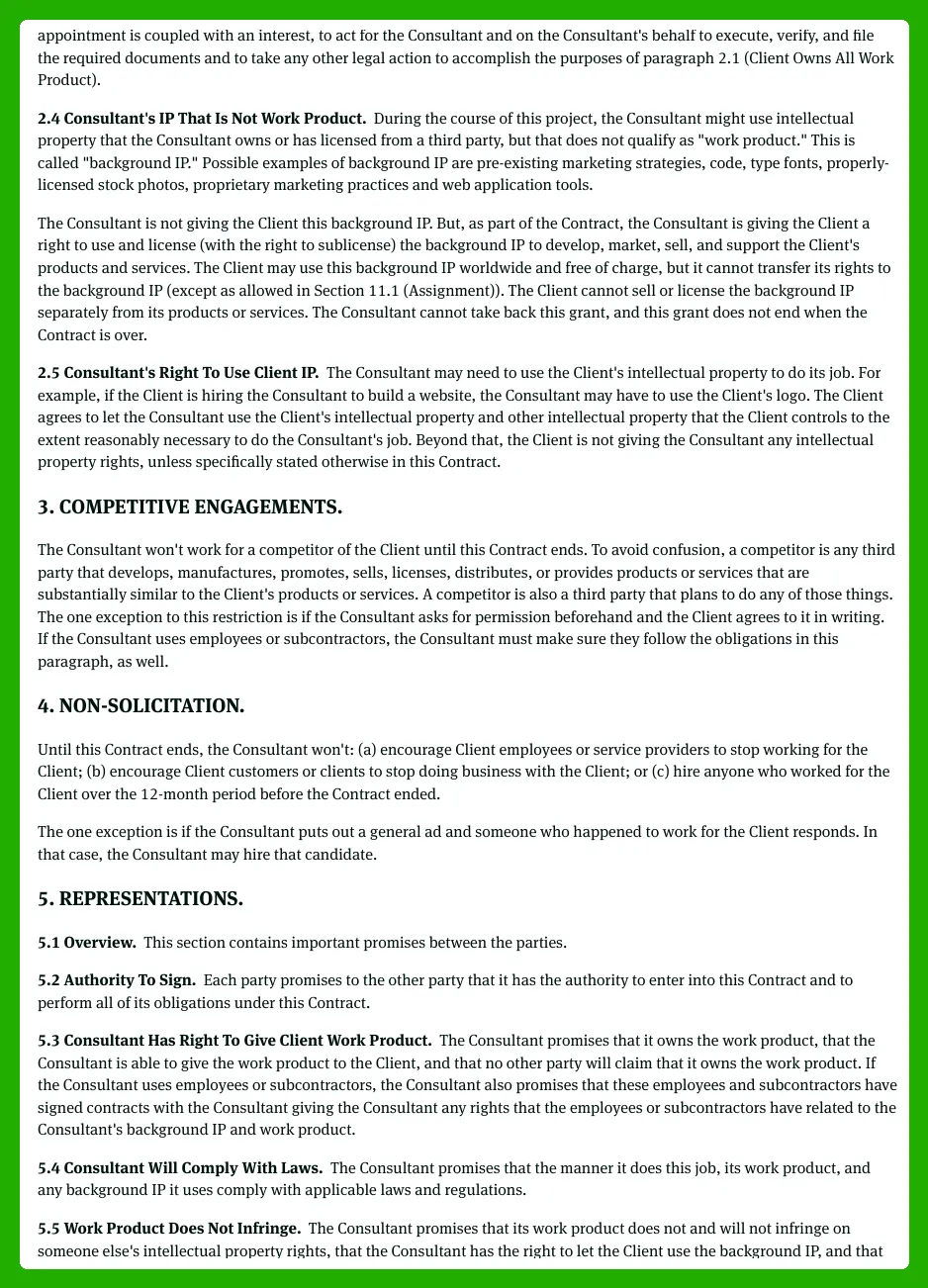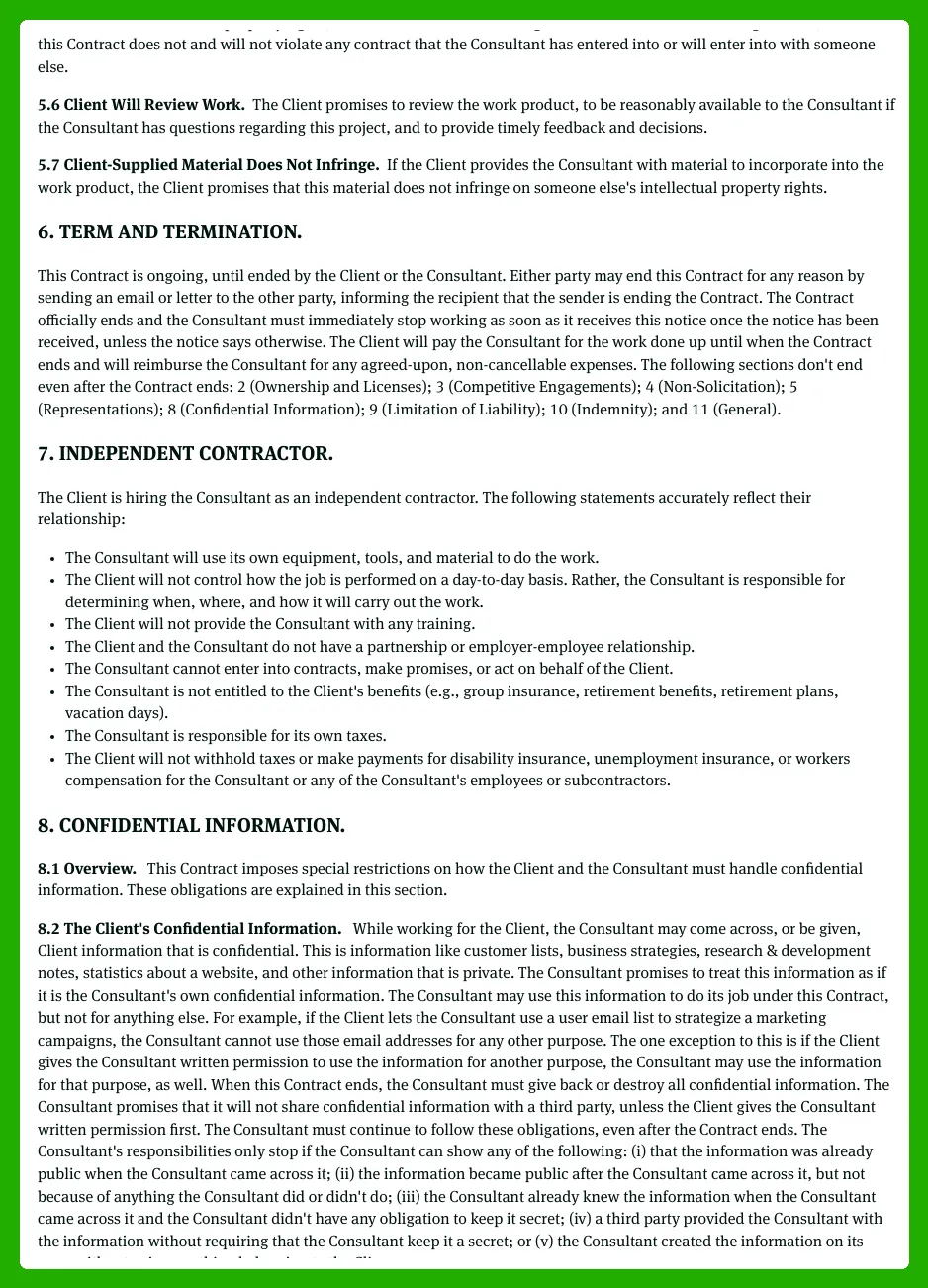Social media marketing is more important than ever for brands and businesses. As with any business arrangement, a contract is essential — but what needs to be included?
Whether you’re a beginner influencer with a small following, an experienced social media manager, or an established brand, enshrining your marketing relationships with a contract is crucial.
Read our guide, because it helps you understand exactly what your contract should include and why templates are the key to making sure you’re covered!
We look at:
- What a social media contract template is and how it works
- Why having a social media management contract is so important
- Essential components of a strong contract
- Different types of social media contracts
- How to use a platform like Bonsai to make the contract creation process easy
- Frequently asked questions.
Let’s get into it!
What Is a Social Media Contract Template?
A social media contract template is a pre-written document that defines an agreement between two parties. They are often used by social media managers, influencers, and marketers when they need to draw up a contract.
A social media contract template outlines responsibilities, defines payment terms, and specifies the platform to be used, such as Instagram, YouTube, Pinterest, or LinkedIn.
The template forms the basis of the agreements between the parties, so everyone is aware of their obligations and is on the same page. A good contract also ensures confidentiality and often includes non-disclosure agreement (NDA) clauses. It also contains rights and obligations for both parties.
A thorough contract template will also include details of payments fees and invoices, as well as taxes and expenses. Free social media contract templates can be found online, such as this Digital Marketing Contract Template from Bonsai.

Why Do You Need a Social Media Management Contract?
You know what a social media management contract is, but do you need one? Won’t a verbal agreement suffice? The answer is yes, you do need one!
Contractors, freelancers, and marketers can all benefit from the protections offered by a social media contract; let’s have a closer look at why they’re so important!
Clear Communication
A good contract requires signatures from both parties, which confirms that everyone involved in the contract is aware of their responsibilities.
A comprehensive agreement details tasks, the scope of the job, and deliverables, and establishes deadlines so there is clarity surrounding expectations and requirements and no misunderstandings.
Legal Protection
Laws and rules are constantly evolving in the United States (and elsewhere in the world!), so a contract is essential.
It has you covered in the event of any disputes, and the clauses covering liability, ownership, and intellectual property rights ensure that everything is clear and above board.
Payment Assurance
A comprehensive contract clearly outlines responsibilities surrounding payments, invoices, and fees. It unambiguously defines payment terms, so you can be confident you’ll receive the correct amount of money for your services.
In the event of late payments or non-payment, the contract guides the process for fixing the situation.
Building Trust
A contract protects both parties and builds trust. When a contractor or company presents a contract, it shows they are professional and value their working relationships. A contract builds trust by ensuring confidentiality and clearly outlining responsibilities on both sides.
Still not sure? Why not download one of the free social media contract templates from Bonsai now?
The Marketing Agency Contract Template and the Branding Contract Template are specifically designed to cover all eventualities that can arise with social media contracts.
And best of all, they’re free! Just create your free account with Bonsai to get access to them!
Key Components of a Social Media Contract
Drafting a social media contract is crucial for a successful partnership between influencers, marketers, companies, and agencies.
The ideal contract is customizable and includes everything that is needed to define the terms of the partnership. Let’s take a closer look at what your contract should include so that you can get the best results from your collaboration and enjoy the benefits:
The Parties Involved
List the names of all individuals, agencies, or businesses that are part of the agreement. This section of the contract should specify the client, the contractor, and any party that is involved.
In some cases, the contract might name employees or social media managers, and indicate what their roles will be in the project.
Duration of the Contract
Clearly state the terms of the contract — this could be for a one-off promotion or an ongoing partnership. Ensure this section provides clarity on the start and end dates of the contract and includes a framework for how to extend the relationship if necessary.
Scope of Work
List everything the contractor or agency is required to deliver. This could be posts or stories on Instagram or LinkedIn articles. List all deliverables, tasks, and content that need to be created so that there is no room for misunderstandings.
Payment Details
This is where all financial aspects should be detailed - ranging from fee structures to payment methods. All costs, expenses, and charges should be listed, as well as a description of how invoices will be issued.
If there are charges involved for products or services provided outside of the initial scope, these should also be listed.

Intellectual Property Rights
Ownership of the social media content and data needs to be clarified for both marketers and influencers. List who holds the rights to the content and how the content can be used.
Confidentiality Clauses
It’s common for social media contracts to include a non-disclosure agreement (NDA). This is designed to protect sensitive information and ensure that neither party shares confidential details with others.
Termination Rules
This section has termination clauses clearly defined. It should include a notice period, acceptable reasons for termination, and any fees or penalties that will be charged.
Types of Social Media Contracts
There are a few different types of social media contracts, and each type serves a specific purpose, ensuring transactions and collaborations go smoothly.
Social Media Partnership Agreement
A social media partnership agreement defines the relationship between two parties. This can be between brands, influencers, or marketers. In most cases, the two parties will have a mutual interest in what is being promoted. The contract should clearly state the terms of how the collaboration will unfold and will include a discussion about resources, materials, and ideas.
The contract will also outline how revenues and profits will be split, and how access to social media accounts will work. It will also define the social media platforms that the promotion will occur on (like Instagram, Tumblr, Reddit, or Snapchat).
Social Media Marketing Contracts
Social media marketing contracts are contracts between marketing agencies and freelancers.
They outline the specifics of the campaigns, strategies, and posts that are required from the influencer in order to meet the terms of the contract. For example, this could range from brand promotions on YouTube to TikTok posts.
The contract will also include the manner of payment and include details on deliverables, deadlines, and ownership of the content to provide protection from liability.
Creating Your Social Media Contract with Ease
Creating a watertight social media contract doesn’t have to be time-consuming or difficult! If you use the right tools and templates, you can create a comprehensive agreement that has you totally covered in just a few simple steps!
Using Platforms like Bonsai
Platforms like Bonsai really take the work out of the contract creation process. Instead of toiling away to create your contract from scratch, you can use our premade contract templates specifically designed for social media management relationships.
The templates work for a range of different promotional platforms, including Tumblr, Vimeo, and Blogger.
With Bonsai, it’s easier than ever for marketers, influencers, and businesses to create robust contracts that reflect the best practices of their industries.
And best of all, templates from Bonsai are watertight! No need to worry that you’ve forgotten something essential; the templates include all the key elements you need, such as payment details, duration of agreement, and scope of work.
Customizing Your Contract
Every brand and social media influencer is unique, and that’s why all Bonsai contracts are fully customizable and can be amended to your preferences.
This gives you control and means that you can ensure that the contracts reflect the individual needs of both parties.
You can adjust the wording, payment terms, and deliverables to ensure you reflect the exact nature of your collaborations.
The contract is not a static document — it’s a dynamic agreement that reflects the understanding and relationship between both parties, so make the contract work for you!
While creating a social media contract can sound daunting, especially if it’s your first time, it doesn’t have to be!
The range of customizable templates from Bonsai has you covered for every possible situation and takes just a fraction of the time of drawing one up from scratch. Look through the template options available and find the one that perfectly suits your needs.
And did we mention that Bonsai contracts are totally free? Just sign up to get access to their full range of templates, as well as a raft of other services!
How Much Should Social Media Managers Charge?
For social media managers, deciding how much to charge can be a delicate balancing act! There are a ton of things to consider — the complexity of the task at hand, how many hours you will be working, how experienced you are, etc.
If you’re just starting out, it makes sense to begin with a lower fee in order to gain more experience and support you in building up your portfolio.
Once you’ve built up the experience and found your niche in the industry, then you can look at raising your fees and attracting bigger clients.
Remember, you must find a gap to fill so that you can set yourself apart from the competition.
While it might be tempting for marketers to try to do everything, you’ll be better off deciding which platform to specialize in whether that’s Instagram, YouTube, LinkedIn, or Tumblr.
Your location and the language you’re writing in will also play a role — social media managers in the United States may be able to command a higher fee than those in countries that typically have lower wages.
The type of fees also needs to be considered. Some social media managers might prefer a monthly retainer, while others charge per post or per campaign — you’ll need to figure out which is the best situation for you.












.webp)

.webp)




